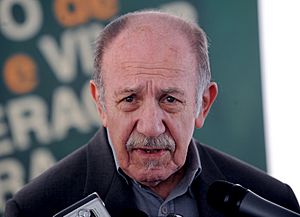Paul Singer (economist) facts for kids
Quick facts for kids
Paul Singer
|
|
|---|---|

Paul Singer at Conferência Nacional de Economia Solidária, 2010
|
|
| Born | 24 March 1932 |
| Died | 16 April 2018 (aged 86) |
| Nationality | Brazilian |
| Occupation | Economist and professor |
| Children | André Vitor Singer |
Paul Israel Singer (born March 24, 1932 – died April 16, 2018) was an important economist and professor. He was born in Austria and later became a Brazilian citizen. Paul Singer was known for his work in economics and for helping to create the idea of a "solidarity economy."
Contents
Paul Singer's Early Life
Paul Singer was born in 1932 in Vienna, Austria. His family were Jewish merchants. In 1938, when Paul was six years old, Germany took over Austria. This event was called the Anschluss. Jewish people faced persecution, so his family decided to leave their home.
In 1940, his family moved to São Paulo, Brazil, where they had relatives. When he was a teenager, Paul joined the Dror kibbutz movement. A kibbutz is a type of community, often focused on farming, where people live and work together.
Becoming a Metalworker
In 1951, Paul Singer finished school, studying electrotechnology. He worked as a metalworker from 1952 to 1956. During this time, he became involved with the Metalworkers' Union of São Paulo. In 1953, he helped lead a big strike with 300,000 workers. This strike stopped factories in São Paulo for over a month. Paul Singer became a Brazilian citizen in 1954.
Academic and Political Journey
After working as a metalworker, Paul Singer decided to study economics. He went to the University of São Paulo (USP). At the same time, he was active in politics, joining the Brazilian Socialist Party. He graduated in economics in 1959. That same year, he helped start a political group called Polop.
Teaching and Research
In 1960, Singer began teaching at USP as an assistant professor. He earned his PhD in Sociology in 1966. His research looked at how economic development changed cities in Brazil. This study became his book, Economic Development and Urban Evolution.
From 1966 to 1967, he studied population changes at Princeton University in the United States. In 1968, he returned to USP to teach. However, in 1969, a strict government order called AI-5 took away his political rights. Because of his political activities, he was forced to retire from the university.
Fighting for Change
After leaving USP, Paul Singer joined other researchers and teachers who disagreed with the government. In 1969, they founded CEBRAP – the Brazilian Center for Analysis and Planning. This center became a key place for smart people who were against the Brazilian military dictatorship. He worked there until 1988.
In 1979, he started teaching again at the Pontifical Catholic University of São Paulo (PUC-SP). He taught there for four years and was even the head of the Economics Department.
Founding the Workers' Party
In 1980, Paul Singer was one of the people who helped create the Workers' Party. This was a new political party in Brazil. He worked with other important thinkers and activists to start it.
Later, in 1989, the mayor of São Paulo, Luiza Erundina, asked him to be the city's Secretary of Planning. He held this important job until 1992.
What is Solidarity Economics?
Paul Singer spent his later years studying and promoting something called the solidarity economy. This idea is about people working together in a fair way, often in small groups or communities. It focuses on helping everyone, not just making profits.
In 2011, he worked for the Brazilian government as the National Secretary for Solidarity Economy. He believed that things like community banks could help people escape extreme poverty. Community banks are local banks that serve the needs of a specific community, often helping people who might not have access to traditional banks.
Paul Singer's Legacy
Paul Singer passed away in São Paulo on April 16, 2018. He left behind a legacy of important ideas about economics, social justice, and how people can work together to build a better world.
Published Books
Paul Singer wrote many books about economics and society. Here are a few examples:
- Introdução à Economia Solidária (Introduction to Solidarity Economy), 2002.
- Para entender o mundo financeiro (To Understand the Financial World), 2000.
- O que é Economia (What is Economics), 1998.
- O Capitalismo - sua evolução, sua lógica e sua dinâmica (Capitalism - Its Evolution, Logic, and Dynamics), 1987.
- Desenvolvimento Econômico e Evolução Urbana (Economic Development and Urban Evolution), 1969.
 | Stephanie Wilson |
 | Charles Bolden |
 | Ronald McNair |
 | Frederick D. Gregory |

